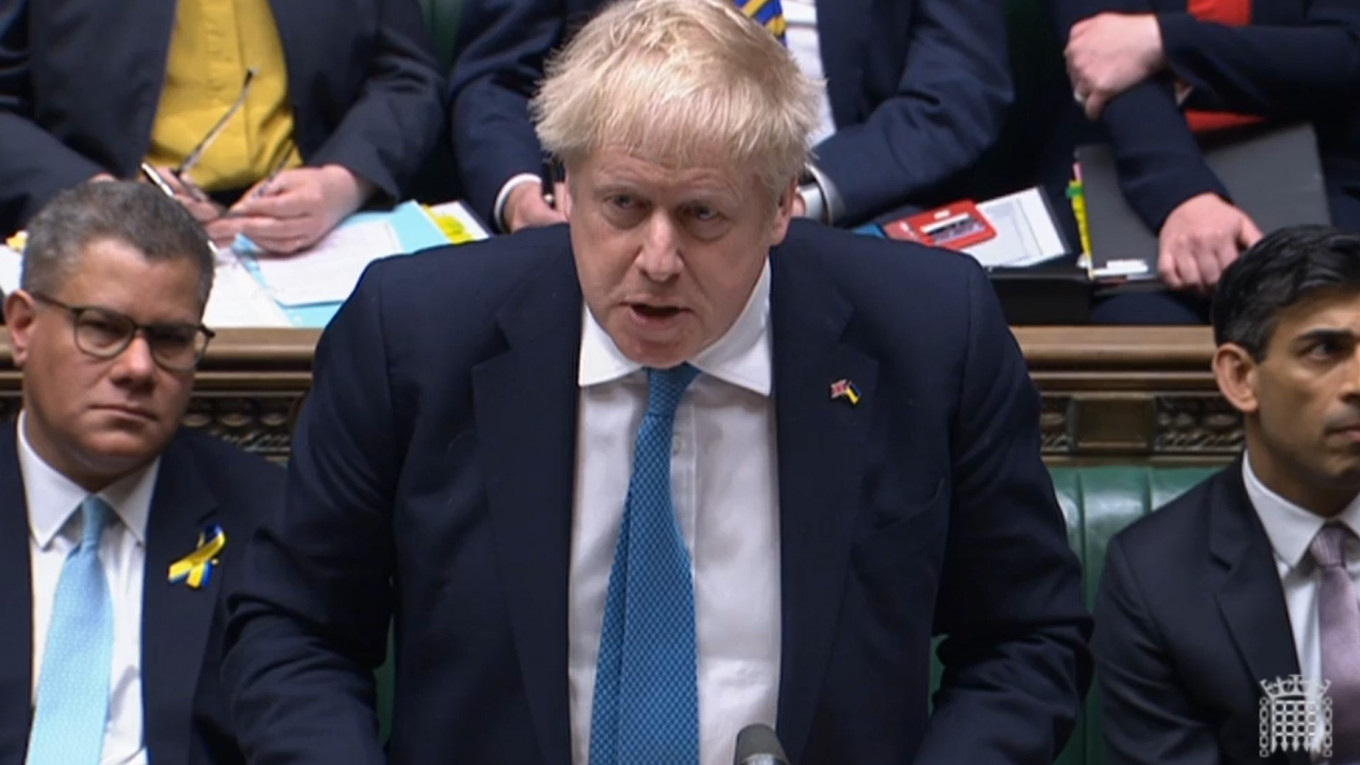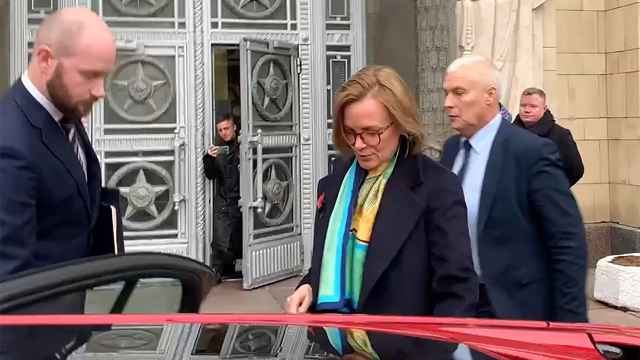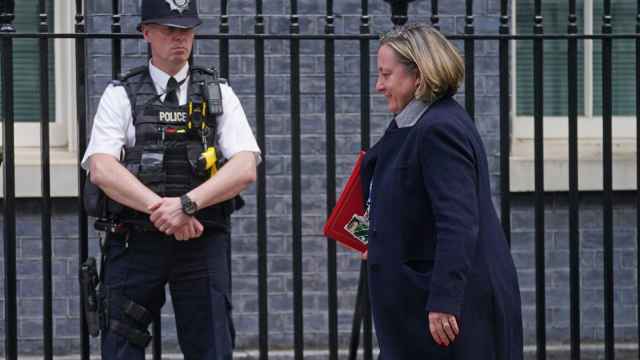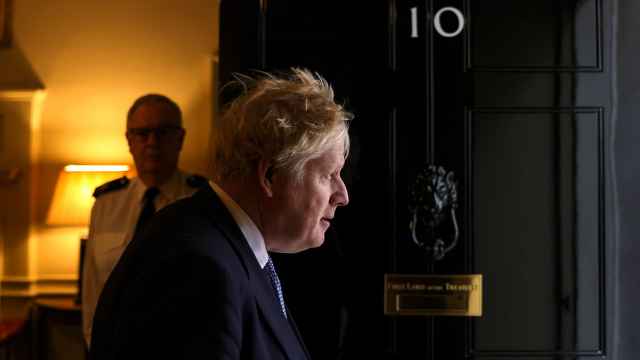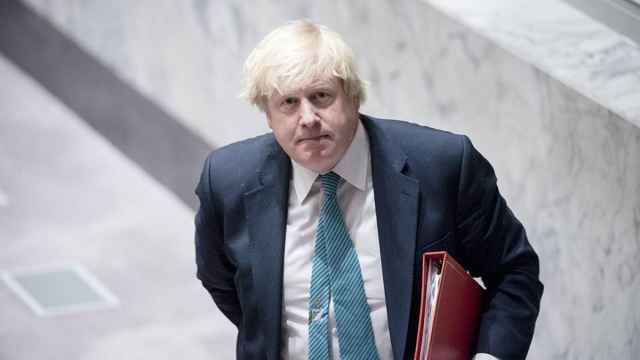The U.K. government warned Tuesday that Russian President Vladimir Putin and his commanders in Ukraine could face prosecution for war crimes, comparing the "sickening" onslaught to the darkest days of the Yugoslav conflicts.
Prime Minister Boris Johnson said Russia's bombardment of Ukraine's second city Kharkiv was "absolutely sickening" and reminiscent of massacres of civilians in Sarajevo in the 1990s, vowing that Western sanctions would remain "for as long as it takes."
"It has that feel to me of an atrocity deliberately committed against a civilian center," he told journalists during a visit to a NATO base in Estonia.
Two shellings of a marketplace during the siege of Sarajevo in 1994 killed over 100 civilians, one of the bloodiest days in the Bosnian War following the break-up of the former Yugoslavia.
Moscow on Tuesday intensified its six-day offensive against Ukraine, killing at least 18 civilians with missiles and artillery strikes in Kharkiv alone.
Visiting Poland earlier, Johnson had condemned Putin's "barbaric, indiscriminate" tactics as the civilian death toll around the country rose.
He said Russia had underestimated the "passionate desire" of Ukraine's people to defend themselves, as well as "the unity and resolve of the West and of the rest of the world."
"And we will keep up the economic pressure," he said, after Britain on Tuesday joined the European Union and United States in sanctioning Russia's biggest lender Sberbank.
The move came after the government on Monday said it would freeze the U.K. assets of all Russian banks and ordered British ports to turn away Russian ships.
"It is plainly already having a dramatic effect," Johnson said, with the Russian ruble and stock market in freefall, and customers queueing to withdraw their savings from banks.
"We are ready to intensify and to keep going for as long as it takes."
Cluster bombs
Justice Secretary Dominic Raab, a former war crimes prosecutor, also recalled the Yugoslav conflicts, saying Britain and its allies would be patient in bringing any violators to heel.
"That's why we're making it clear both to Putin but also to commanders in Moscow, on the ground in Ukraine, that they will be held accountable for any violations of the laws of war," he told Sky News.
The International Criminal Court in The Hague said Monday it was investigating after finding a "reasonable basis" to suspect alleged war crimes and crimes against humanity in Ukraine since Russia seized the Crimea peninsula in 2014.
For Putin, Russian generals and soldiers, "there's a very real risk that they'll end up in the dock of a court in The Hague," Raab added on BBC television.
Amnesty International said Russian cluster bombs hit a pre-school in northeastern Ukraine last Friday that was being used to shelter civilians, killing three people including a child.
Agnes Callamard, who heads the global rights monitor, said the "stomach-turning" attack in the town of Okhtyrka "should be investigated as a war crime."
With hundreds of thousands fleeing the violence, the U.K. said it would relax its immigration requirements for Ukrainians, after criticism it was not going far enough to accommodate refugees.
Home Secretary Priti Patel said some 100,000 Ukrainians could enter the country for 12 months as a result of changes to criteria for close family members.
All applicants will still, however, have to pass security checks, she added, given that "Russian troops are seeking to infiltrate and merge with Ukrainian forces."
A Message from The Moscow Times:
Dear readers,
We are facing unprecedented challenges. Russia's Prosecutor General's Office has designated The Moscow Times as an "undesirable" organization, criminalizing our work and putting our staff at risk of prosecution. This follows our earlier unjust labeling as a "foreign agent."
These actions are direct attempts to silence independent journalism in Russia. The authorities claim our work "discredits the decisions of the Russian leadership." We see things differently: we strive to provide accurate, unbiased reporting on Russia.
We, the journalists of The Moscow Times, refuse to be silenced. But to continue our work, we need your help.
Your support, no matter how small, makes a world of difference. If you can, please support us monthly starting from just $2. It's quick to set up, and every contribution makes a significant impact.
By supporting The Moscow Times, you're defending open, independent journalism in the face of repression. Thank you for standing with us.
Remind me later.


